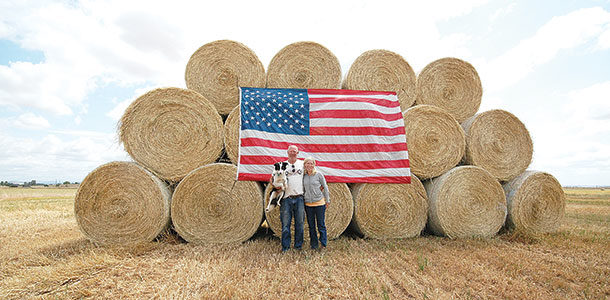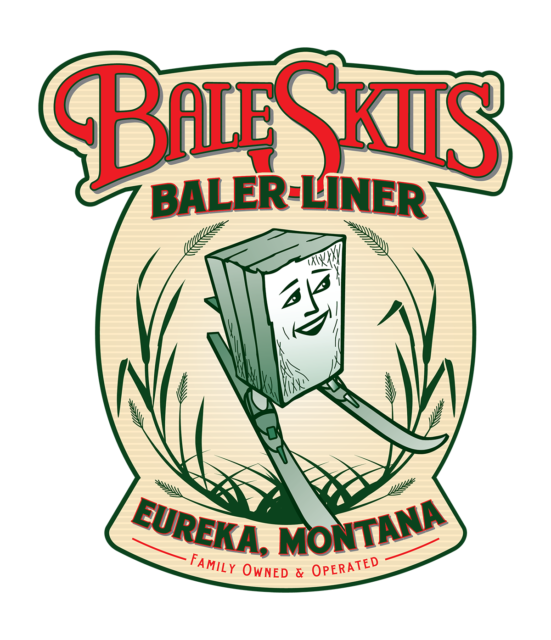Although agriculture no longer plays a central role in Placer County’s economy, this area is still home to a variety of commodities – which makes Keith Gentz’s custom-hay operation just as plentiful as the crops that grow there.
But it isn’t necessarily the number of acres harvested each year that makes Gentz and his family stand out from the rest of his competition; it is the niche market he has created by owning the only round baler in a 500-mile radius and contracting with more than just the typical hay grower.

“We started out nearly 40 years ago with the mindset to grow and sell our own hay, but we quickly found out we could make more money doing it for others,” Gentz says. “Today we have multiple contracts with orchards, organic dairies, nut growers, cattlemen and even a special contract with John Deere to bale California rice straw for their testing purposes.”
Rounding up the customers
Because Gentz owns two small square balers and one round baler, he is often asked by orchards to cut and bale their double-crop. Anytime trees are pulled from the orchard, growers will replace the trees with a secondary crop such as safflower or sudangrass to allow the ground to be treated for nematodes or other pests that may harm the new trees.
For about five to six years, Gentz cuts and bales between the trees as long as the machinery is able to move through without knocking off tree limbs. In the last two years of his contract, he uses the round baler so he doesn’t have to bring in the harrow bed to pick up the bales, which becomes difficult as the tree canopy gets lower.
“At first I was a little skeptical when my friend suggested that I should get a round baler – simply because everything is square in California. But it really has allowed me to do different things in my custom operation,” Gentz says.
Not long after purchasing his round baler, he received a call from his local John Deere dealership wanting to know if he would be interested in a long-term contract cutting and baling California rice straw. Being one of the few who owned a round baler in California, this opened up a great opportunity for Gentz.
Because California rice is the most abrasive on harvesters, John Deere needed rice straw to send to Illinois, where they could test their harvesters and make necessary improvements. And since the nature of a round baler is to keep the length of the stand rather than chopping it up, a round baler is just what they needed to properly test their harvesters.
So for the last seven years, Gentz has put up close to 65 bales each year for John Deere so they can haul it to their Illinois headquarters. He has also been asked a few times for the use of his round bales in commercials and advertisements, which he says testifies to the scarcity of round balers in that area.
However, due to the market for small square bales in California, his small baler remains his biggest and most sought-after business. But the round baler has opened him up to a new set of customers, he says.
Strength in numbers isn’t always the case
Putting up close to 50,000 square bales and more than 800 round bales each year, Gentz notes that he couldn’t do it alone. With the help of his wife, Lorraine, and his nephew, Mark Dufault, they have transformed their family dream into a successful family business.
“I had an old friend that used to tell me, ‘You’ll never make any money with a custom-hay operation. All you will end up doing is wearing out your equipment,’” Gentz says. “It wasn’t even a year later and I had already proven him wrong.”

Gentz says it all started when he became unhappy with how other custom operators were baling his hay. He started purchasing his own equipment. One swather, three balers and one harrow bed later, he found others in the area that were also unhappy and started requesting his services. It wasn’t long until he found himself in the custom-hay business.
“When I was first getting started in the business, I had an old friend helping me run the equipment, but he ended up getting hurt and never fully recovered. It was then that I asked my wife if she would be interested in running the baler and she said ‘Well, I guess so,’” Gentz laughs. “But honestly, it has worked out great. Because she has a vested interest in this business, she cares when something on the tractor doesn’t sound right. She knows that if something breaks, that is money out of our pockets.”
So with Gentz in the swather, his wife running the baler and his nephew close behind with the harrow bed, they make an effective team. Gentz says he has toyed with the idea of hiring temporary help, but he believes it is better to keep the operation small and within the family.
Although they are small in numbers, it doesn’t seem to deter the number of people who are asking for their business. Gentz says they have to turn down a few people each year, but they aren’t afraid to turn down business in order to do it right. They can easily cut 100 acres a day, but to properly bale that much hay, they realize it takes more than just one day.
“It is just the way I was raised, you know – it’s to do it right or don’t do it at all,” Gentz says.
Gentz takes pride in the fact that he and his family started this business from scratch. He says they don’t owe anyone money, they make sure they buy good equipment, they have good credit and long-term customers, and they have a list of other people that want to do business with them when possible.
Making it work in the heat of the drought
Gentz points out, however, that the last 40 years of business haven’t all been “smooth sailing.” In the last two years, Gentz and his family were some of the many California residents affected by the devastating record drought. He says most growers’ yields were down – about half of what they had planned. And since Gentz’s custom-hay operation is paid by the number of bales or tons per acre, his business also lost some critical revenue.

He says almost everyone in his area was affected. But what really hurt him the most was his dry-land farming that he uses to raise hay for sale and to feed his 80 head of beef cattle. In a typical year, he usually gets 3 or 4 tons per acre, but during the record drought, they only harvested 2.5 tons per acre.
“The yields or the tons per acre that we did receive were a Godsend,” Gentz says. “The drought really had an effect on a lot of people in our area. This isn’t the first time California has seen a bad drought, and it probably won’t be the last. It’s just a part of the farming business. I’ve had to learn to adapt and change over the years.”
As for the future of Gentz’s custom-hay operation, he plans to add another swather to the business this year. He knows that if he keeps his business in multiple agricultural sectors and provides quality work, he can keep building his business while staying above the competition.
Although his location may be a huge benefit to his operation, it is his relationship with his family, attention to detail and willingness to try something new that really sets his custom business apart. FG
PHOTOS
PHOTO 1: Keith and Lorraine Gentz take pride in the fact that they built their successful family operation from scratch.
PHOTO 2 & 3: Because of the market in California, square bales remain Gentz’s biggest business.
PHOTO 4: Mark Dufault, Gentz’s nephew, typically operates the harrow bed. Photos courtesy of Keith Gentz.










